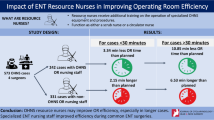Abstract
Introduction
Improving operating room (OR) inefficiencies benefits the OR team, hospital, and patients alike but the available literature is limited. Our goal was, using a novel surgical application, to identify any OR incidents that cause delays from the time the patient enters the OR till procedure start (preparatory phase).
Materials and methods
We conducted an IRB approved, prospective, observational study between July 2018 and January 2019. Using a novel surgical application (ExplORer Surgical) three observers recorded disrupting incidents and their duration during the preparatory phase of a variety of general surgery cases. Specifically, the number and duration of anesthesia delays, unnecessary/distracting conversations, missing items, and other delays were recorded from the moment they started until they stopped affecting the normal workflow.
Results
Ninety-six OR cases were assessed. 20 incidents occurred in 18 (19%) of those cases. The average preparatory duration for all the cases was 20.7 ± 8.6 min. Cases without incidents lasted 19.5 ± 7.4 min while cases with incidents lasted 25.9 ± 11.2 min, p = 0.03. The average incident lasted 3.7 min, approximately 18% of the preparatory phase duration.
Conclusion
The use of the ExplORer Surgical app allowed us to accurately record the incidents happening during the preparatory phase of various general surgery operations. Such incidents significantly prolonged the preparatory duration. The identification of those inefficiencies is the first step to targeted interventions that may eventually optimize the efficiency of preoperative preparation.

Similar content being viewed by others
References
Divatia JV, Ranganathan P (2015) Can we improve operating room efficiency? J Postgrad Med 61:1–2
Cima RR, Brown MJ, Hebl JR, Moore R, Rogers JC, Kollengode A, Amstutz GJ, Weisbrod CA, Narr BJ, Deschamps C, Surgical Process Improvement Team MCR (2011) Use of lean and six sigma methodology to improve operating room efficiency in a high-volume tertiary-care academic medical center. J Am Coll Surg 213:83–92 discussion 93-84
Childers CP, Maggard-Gibbons M (2018) Understanding costs of care in the operating room. JAMA Surg 153:e176233
Stotts M, Keithley E, Beams M, Romp CR (2019) On the clock: reorganizing for unit efficiency and satisfaction. Nursing 49:20–22
Zhou J, Dexter F (1998) Method to assist in the scheduling of add-on surgical cases–upper prediction bounds for surgical case durations based on the log-normal distribution. Anesthesiology 89:1228–1232
Smallman B, Dexter F (2010) Optimizing the arrival, waiting, and NPO times of children on the day of pediatric endoscopy procedures. Anesth Analg 110:879–887
Dexter F, Traub RD (2002) How to schedule elective surgical cases into specific operating rooms to maximize the efficiency of use of operating room time. Anesth Analg 94:933–942
Gottschalk MB, Hinds RM, Muppavarapu RC, Brock K, Sapienza A, Paksima N, Capo JT, Yang SS (2016) Factors affecting hand surgeon operating room turnover time. Hand (N Y) 11:489–494
Leroy J, Schmidt AM (2016) The effect of regulatory focus on attention residue and performance during interruptions. Organ Behav Hum Decis Process 137:218–235
Chapman WC Jr, Luo X, Doyle M, Khan A, Chapman WC, Kangrga I, Martin J Jr, Wellen J (2019) Time is money: can punctuality decrease operating room cost? J Am Coll Surg 230(2):182–189
Muller M, Jurgens J, Redaelli M, Klingberg K, Hautz WE, Stock S (2018) Impact of the communication and patient hand-off tool SBAR on patient safety: a systematic review. BMJ Open 8:e022202
Tagge EP, Thirumoorthi AS, Lenart J, Garberoglio C, Mitchell KW (2017) Improving operating room efficiency in academic children's hospital using Lean Six Sigma methodology. J Pediatr Surg 52:1040–1044
Attri JP, Sandhu GK, Mohan B, Bala N, Sandhu KS, Bansal L (2015) Conflicts in operating room: focus on causes and resolution. Saudi J Anaesth 9:457–463
Benham E, Richardson W, Dort J, Lin H, Tummers AM, Walker TM, Stefanidis D (2017) What is the value of the SAGES/AORN MIS checklist? A multi-institutional practical assessment. Surg Endosc 31:1821–1827
Hu YY, Arriaga AF, Peyre SE, Corso KA, Roth EM, Greenberg CC (2012) Deconstructing intraoperative communication failures. J Surg Res 177:37–42
Friedman DM, Sokal SM, Chang Y, Berger DL (2006) Increasing operating room efficiency through parallel processing. Ann Surg 243:10–14
Dexter F, Epstein RH, Traub RD, Xiao Y (2004) Making management decisions on the day of surgery based on operating room efficiency and patient waiting times. Anesthesiology 101:1444–1453
Caggiano NM, Avery DM 3rd, Matullo KS (2015) The effect of anesthesia type on nonsurgical operating room time. J Hand Surg Am 40(1202–1209):e1201
Wong J, Khu KJ, Kaderali Z, Bernstein M (2010) Delays in the operating room: signs of an imperfect system. Can J Surg 53:189–195
Milone MT, Hacquebord H, Catalano LW, 3rd, Glickel SZ, Hacquebord JH (2019) Preparatory time-related hand surgery operating room inefficiency: a systems analysis. Hand (N Y):1558944719831333
Sanford JA, Kadry B, Brodsky JB, Macario A (2015) Bariatric surgery operating room time–size matters. Obes Surg 25:1078–1085
Dexter F, Epstein RH, Lee JD, Ledolter J (2009) Automatic updating of times remaining in surgical cases using bayesian analysis of historical case duration data and "instant messaging" updates from anesthesia providers. Anesth Analg 108:929–940
Funding
ExplORer Surgical Corp., Inc. (Chicago, IL).
Author information
Authors and Affiliations
Corresponding author
Ethics declarations
Disclosures:
We received an institutional funding from the ExplORer Surgical Corp., Inc. (Chicago, IL). Grant # 45-88-296. Dr. Dimitrios I. Athanasiadis received an institutional fund from ExplORer Surgical Corp. Dr. Sara Monfared received an institutional fund from ExplORer Surgical Corp. Dr. Ambar Banerjee received an institutional fund from ExplORer Surgical Corp. Dr. Annabelle Butler received an institutional fund from ExplORer Surgical Corp. Mr. Jake Whiteside received an institutional fund from ExplORer Surgical Corp. Ms. Donna Keller received an institutional fund from ExplORer Surgical Corp. Dr. Dimitrios Stefanidis received an institutional fund from ExplORer Surgical Corp.
Additional information
Publisher's Note
Springer Nature remains neutral with regard to jurisdictional claims in published maps and institutional affiliations.
Rights and permissions
About this article
Cite this article
Athanasiadis, D.I., Monfared, S., Whiteside, J. et al. What delays your case start? Exploring operating room inefficiencies. Surg Endosc 35, 2709–2714 (2021). https://doi.org/10.1007/s00464-020-07701-6
Received:
Accepted:
Published:
Issue Date:
DOI: https://doi.org/10.1007/s00464-020-07701-6




